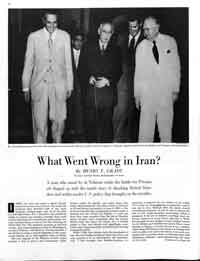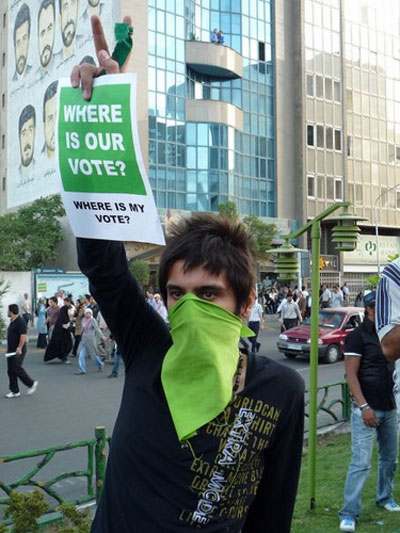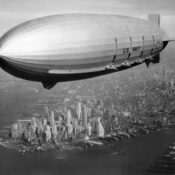The faces in the Tehran crowd are young, yet many are old enough to recall the last uprising in their country. Back in 1979, the country voted for a theocratic government, overturning the undisputed rule of the Shah. The United States offered the Shah asylum and refused to return him to Iran where the new government wanted him to stand trial.
Look a little closer at the photos today, and you might see older Iranians—men and women who can remember two uprisings ago, and the role America played in its outcome. Unfortunately, their memories might be a little clearer than those of American pundits and politicians who are urging the United States to intervene in Iran politics.
In 1952, the Post printed an article from the former U.S. ambassador to Iran, in which he described the pressure the British government was putting on its former protectorate. The Iranian government, led by Prime Minister Mohammed Mossadegh, was nationalizing the country’s oil industry. Great Britain was hoping to retain control over the Iranian oil fields by reducing its financial support and its payments for oil.

By Henry F. Grady
1952
Click image to download PDF
The 1952 Post article by Henry F. Grady, “What Went Wrong in Iran,” reported the following:
“Until the British were ousted, Iran was the largest oil-producing nation in the Persian Gulf area … Even if there was no oil in Iran and the countries adjacent to it, acquisition of Iran would fit neatly into the well-defined purpose of the [Soviet government] … that of pressing Russian imperialist expansion wherever possible. Iran is the natural first step in any Soviet drive southward. … Unfortunately, the dangers involved in the Iranian oil dispute were painfully slow to be appreciated either in London or Washington. The Anglo-Iranian Oil Company, without check from the British Foreign Office, fomented a situation which could not have served Russia’s purposes better if she had planned it herself.”
Grady was referring to oil embargo, which was Iran’s response to Britain’s pressure on the Mossadegh government. Things were to go much more wrong within the next year.
“The concept that financial pressures would bring the Iranians into line and solve the oil problem in Iran was, from the beginning, the key to the British blunders which proved so costly. This notion springs from a colonial state of mind which was fashionable and perhaps even supportable in Queen Victoria’s time, but is not only wrong and impractical today but positively disastrous. It is an attitude which seems to persist in spite of the British experiences in India, Burma, Ceylon and Egypt. In Iran, it was expressed in variations of this theme: ‘Just wait until the beggars need the money badly enough—that will bring them to their knees.’ I heard that vapid statement so often that it began to sound like a phonograph record.
“The British attitude simply failed to take into account the rising tide of nationalist-independence sentiment in formerly colonial or semicolonial countries such as Iran. It led the British to underestimate Mossadegh beyond all reason, for it could hardly be easy to get rid of a man who regularly gets unanimous votes of confidence from both houses of the Iranian Parliament and who apparently has the support of approximately 95 percent of the country’s population. And even the removal of Mossadegh from the scene would not guarantee the rise of a “more reasonable man in his place. On the contrary, experience throughout history shows that economic confusion and disintegration lead to the selection of radicals rather than moderates.
“Not the least of the British errors has been the tendency to discount Mossadegh’s power and leadership. Mossadegh is a man of great ability as a popular leader and is regarded even by his critics as thoroughly honest. He is also a man of great intelligence, wit and education—a cultured Persian gentleman. He reminds me of the late Mahatma Gandhi. He is a little old man in a frail body, but with a will of iron and a passion for what he regards as the best interests of his people. If he does great harm and, in effect, serves the interests of the Soviet, it will not be because he wishes to do so, but because he feels that his real fight is with what he regards as British economic aggression.
“It is indeed fortunate that the British yielded to vigorous American pressure and did not land troops to protect their property and nationals in Abadan. This could easily have led to a clash between British and Iranian troops. In turn, the Soviet Union might well have invaded Iran’s northern provinces to protect Russia’s interests under their interpretation of the 1921 Iranian-Russian Treaty. And of course the presence of British and Russian troops in Iran could easily have brought about World War III.”
The United States reversed its cautious approach a year later. The CIA staged a coup that overthrew the democratically elected government. Complete power was put into the hands of the ever-pliant Shah. Mossadegh was arrested, put on trial, and kept under house arrest until his death.
By 1978, the Shah’s grip on the nation, strengthened by his secret police force, was slipping. As mentioned before, the Shah fled the country. Ayatollah Khomeini became the new head of the nation. The United States refused to hand over the Shah. And on November 4, 1979, Islamic radicals, enraged by U.S. actions, attacked the American embassy and, in violation of international law, held the occupants hostage.
While some American may have forgotten what we did in 1953, their memories are very sharp about 1979, which might explain their fascination with another Iranian adventure.
More: “What Went Wrong in Iran” by Henry F. Grady (PDF)
Become a Saturday Evening Post member and enjoy unlimited access. Subscribe now




Comments
Actually, it oversteps things more than a bit to say that the CIA was critical to the downfall of Dr. Mossadeq (Mossadegh, if you prefer). There are really two sources of information (after the tale picked up and run with, seven years later in 1960, by the Soviet propaganda machine). These are 1) a self-serving book by Kermit Roosevelt, an operative who claims to have engineered the whole thing; and 2) the official report by Donald Wilber, which confirms the assertion that the CIA had indeed, in cooperation with MI6 and using some former British “assets” (Iranians who had worked for British Intelligence), planned to move against the Mossadeq government. However, the Wilber report also states that the operation was hopelessly botched and was called off. Mossadeq was not democratically elected and in fact had been appointed, pursuant to the Iranian constitution, by the Majlis (parliament) and confirmed by the Shah. Locked in a power struggle with the Shah, and upon receipt of a notice of dismissal by the Shah (also within the rules of the constitution) Mossadeq had dissolved his own parliament. The Majlis was re-instated when Mossadeq fell and the exiled Shah returned. The “plot” story was repeated by Madeleine Albright and President Clinton, neither of whom at the time had extensive knowledge of Iranian history of that period, and has certainly gained currency with many academics. It is not at all well documented, and in fact is disputed in the official document.